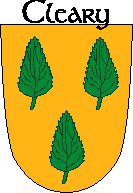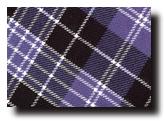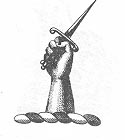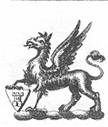Family Histories
- CLARK, CLARKE, CLARKSON, CLEARY, CLERK, LEARY, MacCHLERICH,
MacCHLERY, MacCLAIR, MacCLEAR, MacCLEARY, MacCLERIE, MacLEAR, MacLERIE
The name means a man of a religious order, and later a scholar. Clan Clerich, or Clark, was one of the old 17 tribes of Clan Chattan. The territory occupied by the Clan Chattan during its long history lies mainly in east Inverness-shire and stretches from Inverness in the north to Laggan in the south, and from Glenloy in the west to Glenshee and Invercauld in the east. It embraced the upper stretches of four of Scotland's main rivers: the Nairn, Findhorn, Spey and Dee.
TARTANS: Clark - a modern variant of the 'Clergy tartan', or, if links can be traced to Lochaber or Badenoch, such patterns as are associated with Clans Cameron and Chattan - or that of any other clan to which links can be traced.



 These names evolved largely from the Latin clericus, a term which had almost universal usage describing a person in holy orders, a scholar or a scribe. From the custom of identifying a person by his first name and occupation the name proliferated, but only after 1400 did it become an inherited family name. When translated into Gaelic it becomes Chleirich, resulting in Mac a'Chleirich - son of the clerk (surviving mainly in McCleary, or MacChlery, often anglicised to Clarkson). Families of Clarks/Clerks attached themselves to several clans, first no doubt, as men-of-business to the chiefs. The Clan Cameron in Lochaber, and the Clans Mackintosh and MacPherson in the Confederation of Clan Chattan in and around Badenoch all recognise them as septs. In the latter kindred the Clarks of Clan Chlerich are said to trace descent from Gillemichael vic Chleric, the personal servant of Malcolm, 10th Chief of Mackintosh during the 15th century.
These names evolved largely from the Latin clericus, a term which had almost universal usage describing a person in holy orders, a scholar or a scribe. From the custom of identifying a person by his first name and occupation the name proliferated, but only after 1400 did it become an inherited family name. When translated into Gaelic it becomes Chleirich, resulting in Mac a'Chleirich - son of the clerk (surviving mainly in McCleary, or MacChlery, often anglicised to Clarkson). Families of Clarks/Clerks attached themselves to several clans, first no doubt, as men-of-business to the chiefs. The Clan Cameron in Lochaber, and the Clans Mackintosh and MacPherson in the Confederation of Clan Chattan in and around Badenoch all recognise them as septs. In the latter kindred the Clarks of Clan Chlerich are said to trace descent from Gillemichael vic Chleric, the personal servant of Malcolm, 10th Chief of Mackintosh during the 15th century.
In the early Middle Ages any literate person could style himself clericus, a word which was appended to signatures in countless documents of that time. O'Cleirigh meant "grandson of the scribe" in Irish Gaelic. The surname Cleary came from Cleireach of Connacht, who was born around 829 A.D. Clerk/Clark is the oldest true surname recorded anywhere in Europe. The Irish branch, of this family group, settled in Derry and Donegal, Ireland; where they became famous poets. In Cavan, Ireland, the name was anglized as Clarke.
At the end of the 12th century, a Roger clericus held land in Kelso and in 1249 Alan clericus was a witness to a charter in Aberdeen. There were nine people from Scotland with that name who signed the "Ragman Roll" when King Edward I of England demanded in 1296 that all landowners had to swear allegiance to him. However, it is only after 1400 that we can be certain that it was being used as a surname rather than as a description of someone's occupation or status. Johannes Clark was prior of Scone in 1524. At Durness in Sutherland a family named Clarke can be traced to the 17th century. Richard Clark, a native of Montrose in Angus, became vice-admiral of Sweden in 1623, and a Hans Clerck (of a different family) rose to be an admiral in the same service, - the name still exists in Sweden and Finland in the form Klerck. In 1783, the exploration and settlement of the lands north-west of Ohio in the USA, was carried out by George Rogers Clark(1752-1818). He held possession of the Southwest territory in Ohio, and was of Scottish descent.
The Ragman Roll of 1296 contains the names of nine persons calling themselves Clark, but these probably did not become surnames. Later the surname Le Clerc surfaced. Clerk meant secretary, scribe, scholar, or clerk. In Gaelic it was Cleiriach, which became Cleary and MacCleary in Ireland
Clerk/Clarks found in the Ragman Rolls of 1296 were:
- Clerk of Colgynton, Adam of the County of Edinburgh
- Clerk de Eyeton, William of the County Berwickshire
- Clerk de Louweder, William le fiz Alain of the County of Berwickshire.
- Clerk de Rokesburgh/Roxburgh, Walter County of Roxburgh
- Clerk, Guy burger of Jeddeworth
- Clerk, Pieres, County of Edinburgh.
- Clerk, Richard, citizen of Jeddeworth
- Clerk, William of the County of Lanark
There was never a Highland clan of that name. However, it is frequently found among the Clan Chattan confederacy. Clarks appear to have been a sept (under the protection) of the MacPhersons (whose origins were also from the church, "Mac-a Phearsain" meaning in Gaelic "son of the parson" in the days when celibacy of the priesthood was not enforced).
The clergy in the Scottish Highlands belonged to a militant order. It was recorded that a clergyman in Skye in the 18th century attended church with his two-handed sword, and that his servant walked behind with his bow and a case of arrows.
When Presbyterianism became Scotland's national church, there was opposition and many times the service could not be held or was postponed, when a certain person came to the door . It is said that Colin Campbell, minister of Ardchatten, was denied admittance by the MacDonalds. Campbell, however, was ready for the cause. He was dressed in his kilt, and armed with a sword in one hand and a cocked pistol in the other, and defied the masses to remove him.
The name is common throughout the Lowlands and Highlands of Scotland. It is particularly prevalent in Caithness and there were important families of Clarks in places as far apart as Aberdeen, Edinburgh, Paisley and some have become landed families with baronetcies.
Two unrelated Clarks reached high office in the Swedish navy in the 17th century and the name is found in Sweden and Finland in the form Klerck. The American explorer George Rogers Clark (1752-1818) was of Scottish descent.
Ulva was the original home of Clan MacQuarrie. In about 1850 Francis William Clark, an Argyll landowner, built an impressive modern seat on the island, near the abandoned house of the 16th Chief.
The tartan used by the Clerks is a variation of one called "Blue Clergy" which was worn by ministers, though it dates from the re-invention of tartan after the visit (orchestrated by Sir Walter Scott) of King George IV to Scotland in 1822.
Clan Chattan was the clan of the Clarks. Clark is regarded as a sept (sub-branch) of both Cameron and Macpherson.
Clark was the 14th most frequent surname at the General Register Office in 1995. The name is also common in England where it is often spelt Clarke.